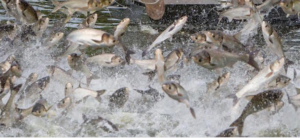 Nashville, Tenn. (December 22, 2020) – Tennessee Wildlife Federation, one of the largest and oldest nonprofits dedicated to conserving the state’s wildlife and natural resources, is hailing a significant funding win in the battle against invasive Asian carp.
Nashville, Tenn. (December 22, 2020) – Tennessee Wildlife Federation, one of the largest and oldest nonprofits dedicated to conserving the state’s wildlife and natural resources, is hailing a significant funding win in the battle against invasive Asian carp.
“Federal legislators have stepped up again to fund Tennessee’s fight against Asian carp, which are destroying native species and harming local economies,” said Michael Butler, CEO of Tennessee Wildlife Federation.
$25M to Erect Asian Carp Barriers on Tennessee, Cumberland Rivers
The Water Resources Development Act of 2020 (WRDA) was passed by Congress, as part of an omnibus package, late Monday. The president is expected to sign the bill.
WRDA is a set of laws periodically updated to deal with water issues such as environmental needs, flood control and navigation.
This year’s version includes $25 million dedicated to projects to manage and prevent the spread of Asian carp in the Tennessee and Cumberland River Basins. The Act does not require funds to be spent specifically on barriers but these are widely viewed as the leading method for limiting the movement of Asian carp.
This single appropriation could reasonably fund three to five barriers that often use combinations of sound, light, bubbles and other technologies. One such barrier is currently being tested at the Barkley Dam, separating the Cumberland River Basin from the Ohio River.
“These barriers are an essential part of the block and tackle method of managing Asian carp,” said Frank Fiss, Tennessee Wildlife Resources Agency’s chief of fisheries. “We have observed very little reproduction by carp in the Tennessee River, especially upstream of Kentucky Lake. Throughout the valley, steady immigration from downstream reservoirs is the greatest concern, and this is a problem that we can control with barriers.”
The Act also establishes an Asian Carp Eradication Program in the U.S. Fish and Wildlife Service. It will provide $4 million a year for 2021 through 2025. Priority will be given to states in the Tennessee and Cumberland River watersheds.
“Tennessee Wildlife Federation is proud of its contributions to securing these funds and extends a thank you to the many groups and people involved in this legislation, particularly Senators Alexander and McConnell as well as Congressmen Kustoff, Burchett, Rose, Roe, Cooper and Cohen—and their dedicated staff,” said Butler. “The Federation has been working with leaders across the Southeast and creating a place for collaboration that helped lead to this funding win.”
The Federation also led a multi-state coalition that resulted in expanded Asian carp funding in early 2020. To learn more about Asian carp and the dangers they pose to fish, waters, and Tennesseans, visit tnwf.org/AsianCarp
National Wildlife Federation produced a short film that explores the many threats Asian carp pose. Watch Against the Current at tnwf.org/FightCarp
About Tennessee Wildlife Federation
Tennessee Wildlife Federation leads the conservation, sound management and wise use of Tennessee’s great outdoors. Since 1946, the Federation has spearheaded the development of the state’s wildlife policy, advanced landmark legislation on air and water quality and other conservation initiatives, helped restore numerous species, and introduced thousands of kids to the great outdoors. To learn more, visit tnwf.org.
###

